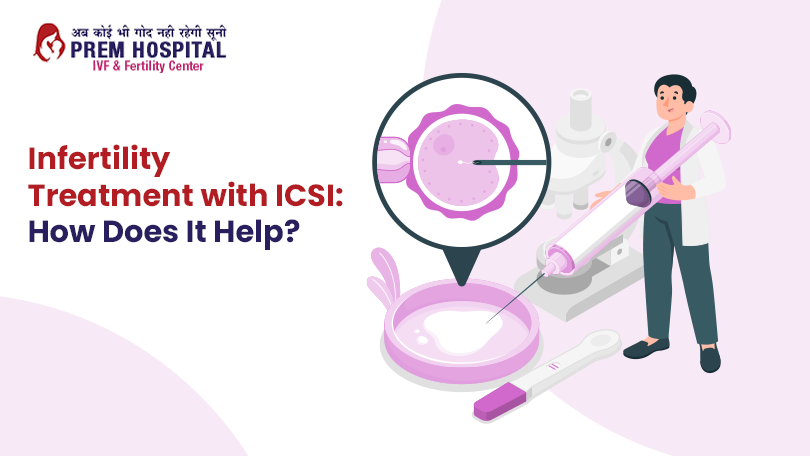Intracytoplasmic Sperm Injection, or ICSI is an infertility treatment that helps people to conceive successfully who are experiencing infertility problems. ICSI is primarily helpful when there is a male infertility issue causing trouble in a normal pregnancy. In ICSI, the sperm is directly injected into the egg. After the successful embryo transfer, pregnancy occurs.
So, if you want to know more about ICSI treatment, keep reading! Here, we will discuss how ICSI treatment helps with infertility?
What is ICSI?
Before we learn about Intracytoplasmic Sperm Injection, or ICSI, treatment procedure or how it helps people with infertility issues, let us know what it is. ICSI is an infertility treatment that helps people who are experiencing infertility. In the ICSI treatment procedure, a live sperm is injected into an egg in the laboratory. This procedure leads to the fertilization of the egg and the embryo creation.
ICSI is a type of in-vitro fertilization treatment that health providers mostly recommend when the person’s ability to conceive a child gets affected by male infertility problems. ICSI is a popular infertility treatment, and you should visit the best fertility hospital for a successful and safe ICSI treatment.
What is the difference between IVF and ICSI?
A lot of people use ICSI and IVF treatment synonymously, but it is not technically correct. Intracytoplasmic Sperm Injection or ICSI fertility treatment is a type of IVF or in-vitro fertilization and not exactly the in-vitro fertilization procedure.
In traditional IVF treatment, a batch of sperm is placed next to an egg in a laboratory tray. Here, if any sperm succeeds in penetrating and fertilizing the egg is picked up for the chance. However, if all sperm fails to fertilize the egg, the IVF cycle also fails.
On the other hand, ICSI treatment involves the direct injection of a single sperm into a single egg for fertilization. However, you must remember that both IVF and ICSI treatment cannot guarantee fertilization.
In both of these fertility treatments, the fertilized egg or embryo is transferred to the woman’s uterus. If the embryo successfully gets attached to the uterus lining, the person becomes pregnant.
Who may need ICSI?
ICSI treatment for pregnancy is most recommended when the problem is caused by male infertility. Below, we will discuss how people with certain issues or health problems may get ICSI treatment recommendations-
- If someone has a blockage in their male reproductive system.
- Problem with ejaculation.
- Retrograde ejaculation, a condition where the semen flows back to the bladder.
- If a person has poor sperm quality.
- If a person faces a low sperm count.
Besides the above male infertility issues, one may also get recommended to go for an ICSI treatment if –
- The person supplying the egg is older than 30 years.
- The traditional IVF or in-vitro fertilization treatment fails to fertilize an egg and create an embryo.
- If the person is using previously frozen sperm or egg to conceive a child.
Benefits of ICSI
Currently, ICSI is one of the most popular fertility treatments globally. This fertility treatment is mostly prescribed when couples experience male infertility issues. It has its own set of benefits. Below, we will discuss some top benefits of availing Intracytoplasmic Sperm Injection or ICSI treatment-
- Selection of healthy sperm – The ICSI treatment procedure enables the selection of healthy sperm to increase the successful Embryo creation. An expert and well-trained embryologist select the healthy-looking sperm to directly inject into an egg. It helps to increase the chances of viable embryo creation.
- Increased fertilization rate – Another essential benefit of using ICSI treatment is increased fertilization rate. ICSI infertility treatment has a higher success rate in comparison to traditional IVF or in-vitro fertilization treatment. It ensures successful fertilization by directly injecting sperm into the egg. As a result, the process successfully bypasses potential barriers to a successful pregnancy.
- Genetic link preserved – ICSI infertility treatment help couple preserve genetic link in their child. Unlike other donor programs, ICSI treatment only uses the sperm and egg of the persons who have undergone the treatment.
What is the success rate of ICSI?
The success rate of Intracytoplasmic Sperm Injection or ICSI treatment is also impressive. This fertility program has a higher success rate than the traditional IVF treatment. Approximately 6 out of 10 in-vitro fertilization (IVF) takes place with ICSI treatment. So, technically, your chances of getting pregnant successfully with IVF and ICSI are the same. However, the estimated success rate of ICSI fertilization ranges between 50% to 80%.
Conclusion
ICSI, or Intracytoplasmic Sperm Injection is a type of in-vitro fertilization treatment that involves the direct injection of sperm into the egg for fertilization or embryo creation. The success rate of ICSI treatment is higher than traditional IVF treatments. This fertility treatment is primarily used where people experience male infertility issues. Above, we have discussed how ICSI fertility helps people with infertility, including what it is, the procedure, the success rate, and more.

